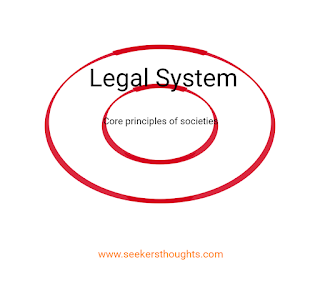Ethics are emphasized socially;
however, every society has different set of ethics depending upon the cultural
and religious belief. So, ethics can be
understood as the set of principles to decide what behavior is considered
right. However, ethics do not always dictate a single moral course of actions,
yet help in evaluating and deciding among competitors.
Ethics go beyond doing what
is legally right and address proper behavior and expectations for those
tasked with the responsibility of planning communities in their roles as public
officials representing the public good.
People often have different and
opposing ethical standards. Ethics are developed from an individual or
group’s beliefs, values and morals, which vary from person-to-person and can
often be in direct conflict and opposition to another’s. For example in
India a love affair is not considered as ethical while it is legally right that
one can decided for himself/herself to choose a partner.
Another example, ethically
marrying with the person of other religious communities have been considered ‘unethical’
among fundamentalist and religious orthodox, while legally, it is not the same.
While the law provides clear
responsibilities and limits to officials and other individuals responsible
for the planning of communities, there is a great deal of flexibility where
individuals or groups must make judgments in the best interests of their
community, and being guided by strong ethical principles ensures that
the best decisions are being made.
On the contrary, if something
is legal then it may not be ethical. For example, racial discrimination was
legal once but was never ethical.
Ethics is about putting
principles into action. Consistency between what we say we value and what
our actions say we value is a matter of integrity.
Ethics is also about
self-restraint, i.e., what we should not do:
-
Not doing what you have the power to do. An act isn’t
proper simply because it is permissible or you can get away with it.
-
Not doing what you have the right to do. There is a big
difference between what you have the right to do and what is right to do.
-
Not doing what you want to do. In the well-worn turn of
phrase, an ethical person often chooses to do more than the law requires and
less than the law allows.
Ethics is the rules for deciding correct conduct. Ethics can be
evolved as earlier gay rights were non existent in entire world. There were
some progressive individuals who did not accept the definition they were taught
about being ethical. They did their efforts and today, the world is different
place. Legal system is dependent on the ethics of the society, and core of
legal system remain ethics. However, legally the process of change is slow, until
communities feel themselves that particular law has been hampering the rights
of Individuals.













